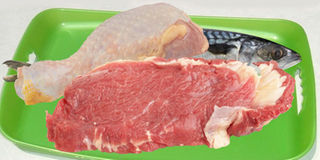Premium
These foods will help your hair grow back

PHOTO | FILE Hair follicles need plenty of protein to produce healthy hairs, so make sure you are eating enough lean meat, chicken, and fish.
What you need to know:
- Hair follicles need plenty of protein to produce healthy hairs, so make sure you are eating enough lean meat, chicken, and fish
I am only 35, but have started to lose my hair. Are there nutritional supplements that might help?
You do not say whether you are male or female, so I have included advice for both.
Men
Although hair loss can sometimes be due to periods of extreme stress, for most men, male pattern hair loss (androgenic alopecia) is caused by oversensitivity to male sex hormones.
In many cases, this is genetic — ever notice how none of your male family members have a full head of hair as they reach middle age? Although natural hair loss cannot be prevented, if the diet is well balanced and rich in key nutrients, the rate of loss can be slowed down.
I have seen some good results for hair thinning by supplementing 160 mg of the herb saw palmetto, twice a day. Since it is the fatty acids in this herb that seem to be most biologically active, choose a supplement that is standardised to 45 per cent fatty acids.
Over six months, saw palmetto has been shown to have good effects on hair gain, comparing favourably with hair restoring drugs such as finasteride.
Women
In women, the most common nutritional cause of hair loss is low ferritin levels. Ferritin is iron that is stored in the body, as opposed to the kind that is found in the blood. Ideally, your ferritin level should be 70micro g/L or above.
If a lab test confirms that your ferritin level is too low, you can either eat more iron-rich foods (lean red meat, sukuma wiki, sardines, offal, and pulses) or take an iron supplement.
I like to use the latter since I can ensure optimum intake of iron. That said, the type of iron is vital. Some iron supplements can sit in the gut longer than necessary, and therefore increase your risk of certain cancers. The organic form is better absorbed.
At the same time, avoid drinking tea or coffee with meals, since this can affect iron absorption. Go for vitamin C-rich fruit and vegetables, which enhance assimilation of iron.
Nutritional Help for Both
Hair follicles need plenty of protein to produce healthy hairs, so make sure you are eating enough lean meat, chicken, and fish. Although lentils and beans are a great source of protein, they also contain substances that bind to minerals, thereby preventing their uptake. Therefore, limit them to no more than three times a week and choose other vegetarian protein sources like eggs, soya, and nuts.
A lack of B vitamins such as biotin and folic acid are also linked to hair loss. Rather than an expensive hair and nail supplement, look for a high strength B complex with 50mcg vitamin B12 and biotin and 400mcg folic acid and 50mg of all the other B vitamins.
Finally, regular aerobic exercise can also help since it stimulates the heart and circulation, increasing oxygen flow to the scalp (as well as reducing stress levels).
On the days you fail to make it to the gym, mix 15 drops of essential oil of rosemary into about an ounce (28g) of a carrier oil (like olive, almond or grapeseed) and massage it into your scalp. Not only can this help to remove layers of cells, but it also helps to bring oxygenated blood to the scalp, which is crucial for healthy hair follicles.
The writer is a clinical nutritionist and certified by the Nutritional Therapy Council in the UK. Send any questions about family nutrition to her on [email protected]




